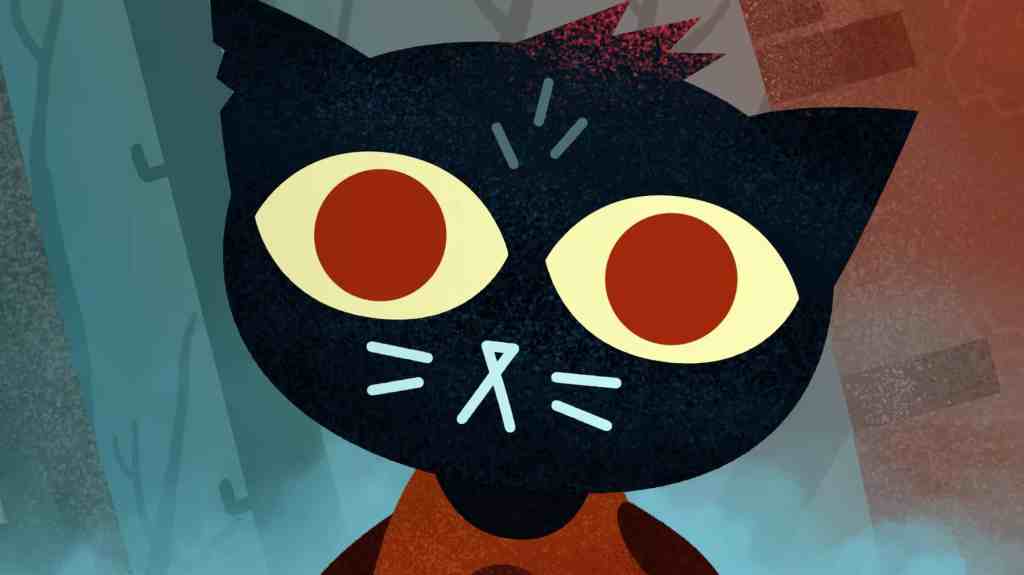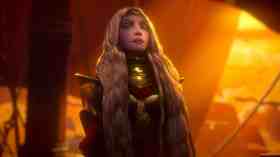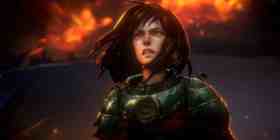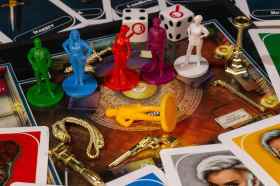It has been six long years since Night in the Woods (NITW) was released. Six years since being introduced to Mae Borowski, a punky college-dropout cat who returns to her hometown to find things have changed; to find that life goes on in Possum Springs, despite the passing years.
The success of the game is reflected in its many positive reviews, and a cult following which sees fans creating memes, and collectively trying to solve unresolved mysteries that still weigh heavily over the town. The game is praised for its explorative nature, its exceptional dialogue system, and the combination of art style, soundtrack, and subtle game mechanics that give Possum Springs and its residents texture and authenticity.
I often look back on it as a coming-of-age trojan horse that, when you allow it to burst open, ambushes you with themes around faith, community, class struggle, and agency. It is especially prominent in discussions around video games and portrayals of mental illness, with both players and critics being divided on how effectively and carefully Night in the Woods has explored these themes.
Much of this can be condensed into how people feel about the character of Mae, and how far they’re willing to go as players to deal with her. I argue that, on top of all the wonderful little things the game achieves, unlike other narrative-driven games which validate our own personal experiences of mental illness, Night in the Woods forces players to empathise with people who are not them.
The mechanics of empathy
The nature of many video games is that players can control an avatar, which encourages the experience of putting yourself in someone else’s shoes. The base assumption here is that people must think about themselves in order to understand others, and that to imagine you are them, you have to feel what they are feeling. Thanks to a mixture of frustrating dialogue options and mechanics, this game makes sure that you never feel like you are Mae, and this distance becomes wider as the game continues.
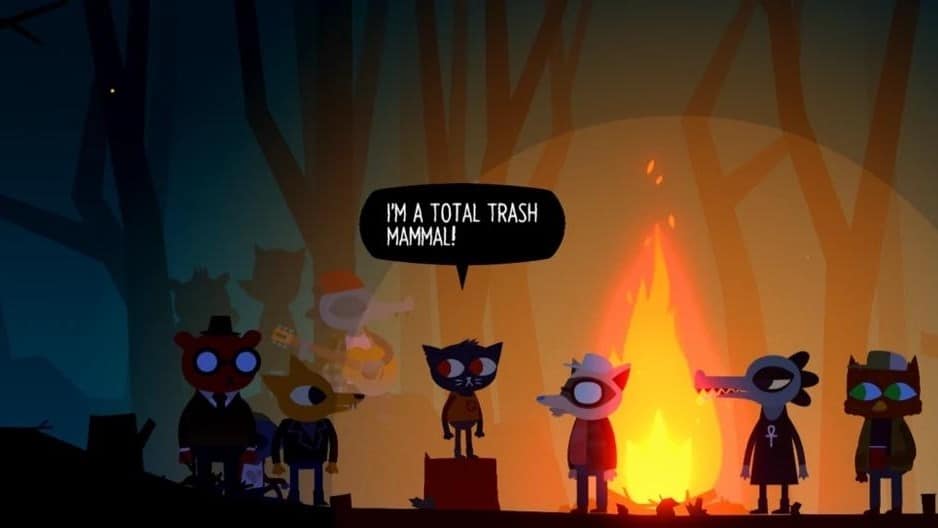
Night in the Woods is subtle and slow in its approach to this. Initially, it’s interesting to find out who Mae is through her interactions with her parents, old pals, and random townsfolk. There is a welcoming, explorative phase that feels like unbounded freedom; you can decide who to talk to, how you talk to them, if you spend the day in the attic playing games or bass guitar or jumping around on power lines until you find friends to bug at their places of work.
You feel that thrill reminiscent of school holidays, or blips of unemployment where everyone is busy with their lives except for you. Maybe Mae is going through it a bit, so you make her sit on the kitchen bench and tell self-deprecating jokes to her mother, or you help her steal a pretzel just to see if she can get away with it.
I myself once graffitied a bathroom stall at my local pub, simply because I had a quote in my head, some beer in my belly, and a marker in my bag. The instinct to ‘do crimes’ of petty nature resonates with players on the basis that it comes from Mae’s ‘punky’ side, not her distressed one.
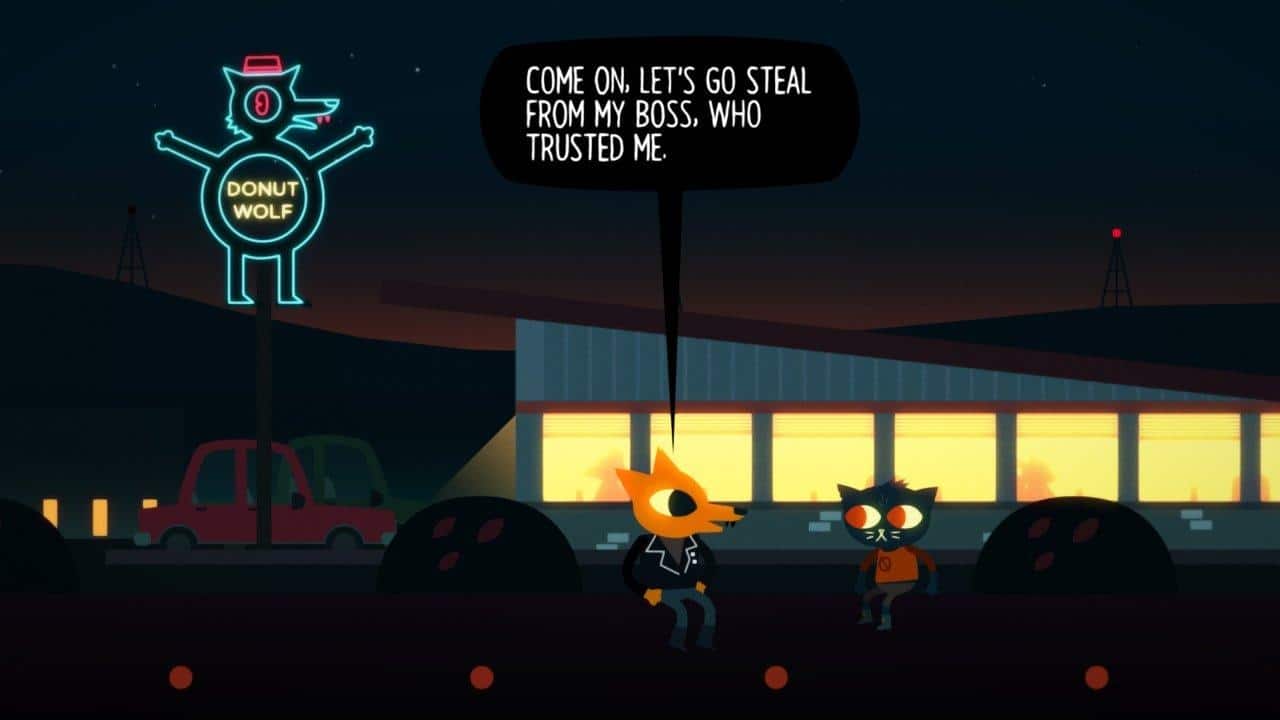
All the while you are sympathetic to Mae’s feelings because you are also curious about where they come from. Why did she drop out? What is this unspoken thing that happened here all those years ago? What is the reason for her behaviour? Eventually, these questions are somewhat answered, but by that time, you have already seen Mae be a complete dick to everyone she loves.
Agency and the illusion of choice
As the game progresses, you realise you never had full control of Mae. You cannot stop her from drinking too much and causing a scene at a party. You cannot replace her words of vitriol with those of compassion for her parents. You so badly want to help Mae, but the only choices you’re given are the ways in which she should be an asshole. This folds back into one of the larger themes of the game; a pervasive lack of agency.
There is a lot of discourse around class struggles in Night in the Woods. You see it in the various ways that characters seem ‘stuck’ in Possum Springs; Mae’s father working in unfair conditions at a big-chain supermarket, Mae’s mother talking about struggles with mortgage payments, her friends working jobs that they hate in order to get the fuck out. On a wider scale, these characters are making the least-shittiest choices in a place where they wouldn’t have to if their social and economic systems were better.
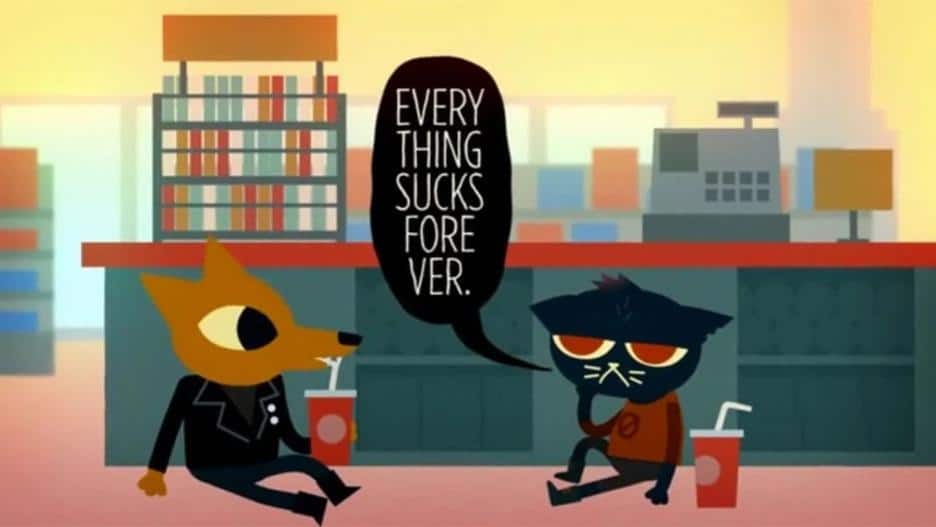
This lack of agency is something that is delicately played with between the dialogue and mini-game mechanics of Night in the Woods, and is most significantly expressed through Mae’s mental illness. A lot of excellent games have perfected the art of toeing this line; giving players a sense of freedom and choice in a world that, by its very nature, must have rules and parameters. Good games will often chisel away at that divide between player and avatar and make you forget that it’s pre-programmed and determined.
Night in the Woods gives you the illusion of choice in some ways, but blatantly takes it away when controlling Mae. Future activities, dialogues, and endings are determined by making choices; should Mae go steal things at the mall with Bea? Ride into the woods to have a friendly knife fight with Gregg? What you choose influences the story, but it doesn’t necessarily change Mae’s behaviour.
This is a common experience of mental illness that we often don’t forgive in others; people may make bad choices because all they’re given is a menu of bad choices. Wonderfully, contending with this lack of agency within the gameplay helps to identify it in Mae’s experience.
Dislike is a strong word
I am less forgiving of people who do not enjoy Night in the Woods. It’s understandable if you are someone who doesn’t like slow-paced narrative-driven games, or animated anthropomorphic animals. But my experience of the negative reviews around NITW often seems to be written through the lens of disliking Mae, and wondering why the developers would centre a game on such a grating character. Players seem particularly frustrated that although Mae strengthens her relationships, she does not seek help in any professional or medical sense.
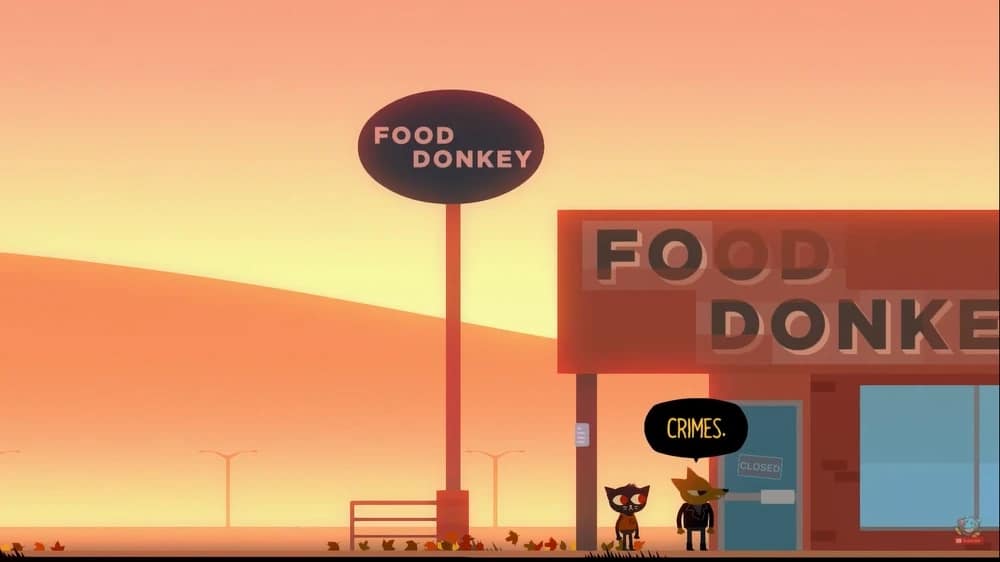
The pacing of the game and the built environments keep you focused on the small, everyday things. It wants you to take things a day at a time out of necessity, but to also accept that change is slow and sometimes unrealistic. That trauma can often keep people stuck in the past and stunt growth.
It is hard to love Mae. How many people do we already know from our real lives who are so wrapped up in their own problems they forget you? How often must we come back to that same realisation, that those who need the most care are often the hardest to care for?
Night in the Woods is a hard lesson in empathy. The friction created is not through the mini-games, where you have to stealthily move Mae’s arm in order to steal things unobserved, finding and collecting instrumental melodies in Mae’s nightmares, or successfully smashing up a car with a baseball bat. These are the fun, tactile things that keep you engaged.
The hardest part is accepting Mae for who she is currently and being okay with the absence of closure.
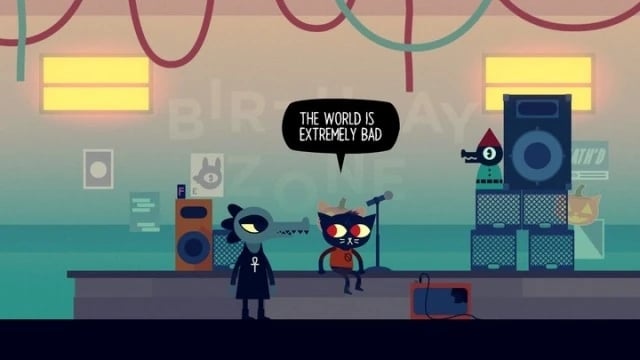
Of course, none of her behaviour could be stomached without the larger atmosphere of the game, the patience of Mae’s people, and the humour and tenderness imbued in every piece of dialogue.
After I graffitied that pub bathroom with a quote, I went months trying to recall where I had seen it. In writing this I was reminded of the scene where Angus helps Mae climb to the top of the hill, struggling the whole way because of his asthma. They take a beautiful moment to mark out constellations in the sky and Angus, who knows Mae the least and has no obligation to help her, says:
‘… I believe in a universe that doesn’t care, and people who do.’
Of course, I wrote his words on a night when we were, as usual, feeling horrified by the world, but could at least be amongst people who had decided to deal with each other.
Night in the Woods is available on PC, Mac, Nintendo Switch, PS5, PS4, Xbox Series X/S, and Xbox One.
GamesHub has affiliate partnerships. These do not influence editorial content. GamesHub may earn a small percentage of commission for products purchased via affiliate links.
